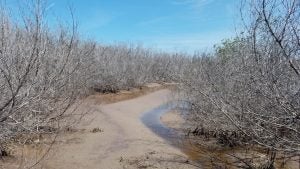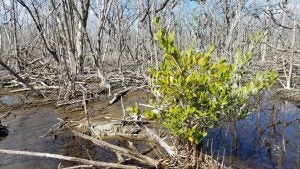Researchers Develop Framework to Better Predict Storm Impacts on Ecosystems

Hurricane Irma swept through Florida in September 2017, but even in 2020 many of the impacted mangrove forests, like this one in Long Key State Park, have not recovered.
Tropical cyclones (hurricanes and typhoons) can alter the way our global coastlines function. However, each hurricane is different and has varying levels of impact on the coast due to any number of assorted storm characteristics including strength, rainfall, timing and location of landfall. While these extreme storm events are becoming more and more common, the ability to predict the ecological damage from a storm has remained static. Often, opportunistic rapid grants are awarded for site and storm-specific studies; however, each of these projects alone has limited impact for large-scale, long-term implications.
Fortunately, a team of researchers from over 15 departments and institutions, including ECU’s David Lagomasino, have compiled a database of such projects and others to create an integrated research framework which will help scientists better understand, and therefore predict, the effects of cyclones across different ecosystems. The team has created this framework by focusing on the resistance and resilience of ecosystems within hard-hit areas. Collectively, they synthesized the results from projects that studied the impact of individual hurricanes and cyclones across the Caribbean and East China Sea. “Using examples from these studies of primary productivity (how healthy the vegetation is), stream biogeochemical export (what and how much is in the water runoff), and organismal abundance (how many critters) the framework helps to compare the impacts of tropical cyclones within and across ecosystems.”, Lagomasino explains.

This Everglades forest exhibits signs of resilience with the green, leafy mangrove in the foreground.
The integrated framework hopes to help create a standardized approach to how the impacts of tropical storms are measured by reconciling the differences between ecosystems and storm characteristics. Being able to better understand how coastal ecosystems respond to storms will help provide information to best preserve the ecosystem services and benefits. In turn, these insights could ultimately aid in the identification and decrease of socioeconomic issues related to cyclone impact.
The team has recently published a paper in the journal BioScience. The paper includes a call to action to identify and continuously collect data from a network of sentinel sites to increase the understanding of long-term ecosystem response to tropical cyclone affected areas around the world.
For more information on The Lagomasino Lab please visit https://blog.ecu.edu/sites/cool-science/.